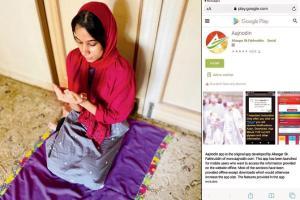As mosques remain shut to enforce social distancing and late-night eatery stalls may not operate, Mumbai's Muslim community preps for a markedly different holy month this year

Fatema Habib, a copywriter, has been using the Aajnodin app, developed by the Shiu00c3u00a2u00c2u0080u00c2u0099ite Bohra community to listen to livestreamed sermons
For as long as he can remember, Suhail Khandwani, managing trustee of Mahim's Hazrat Makhdum Fakih Ali Mahimi Dargah and trustee of Worli's Haji Ali Dargah, has never seen the two mausoleums this silent. Certainly not during Ramzan. The holy month, which began on Saturday, normally sees thousands of worshippers congregate to offer special prayers and share meals in the sprawling precincts. This time, though, tradition has been curtailed to limit the spread of the Coronavirus outbreak. "As of now, only the imam and three others are present at the dargah to conduct rituals and prayers. No visitors are allowed," says Khandwani.
ADVERTISEMENT
Although most understand the need to keep religious institutions locked, some argue that dargahs and mosques should be allowed to remain open at least for Friday prayers. There's no budging, insists Khandwani. "While I agree that the Jummah namaaz is important, we can't go ahead if it involves a risk to human lives. Fasting and iftar will have to be done remotely and privately to ensure everyone is safe and healthy." Khandwani also states that if seen objectively, a remote Ramzan may not be all that difficult. "You can break your fast at home with a single date, or even a pinch of salt. There's no need to step out of home, if you stock up adequately." To ensure this is taken seriously, he and the team of trustees have been sending out circulars through social media, and are requesting senior clerics to reiterate the message.

Only the imam and three other staffers have been allowed to stay at the Mahim kabrastan masjid to conduct rituals and prayers
Fatema Habib, a copywriter with a public relations firm, has been keeping tabs on the Aajnodin app, developed by the Shi'ite Bohra community to livestream sermons and offer information on important religious events. While the app has been around for a while, its relevance is being keenly felt in the face of the pandemic, when Muslims will have to observe fast in quarantine. "They started sending out updates about the website and app over email and on text well before Ramzan so that people could sign up," says Habib, who visits the neighbourhood mosque in Byculla for prayers. Traditionally, the maghrib isha namaz (evening prayers) sees a crowd of no less than 500 people. "It's always a memorable time because you get to meet friends and extended family. It's the season I look forward to," says the 27-year-old.

A file photo of the bylanes of Mohammed Ali Road buzzing during Ramzan as visitors make a beeline to tuck into kebabs and malpuas. "As of now, there is no clarity on whether we'll be able to conduct business in the next few weeks," says Sarwar Khan, manager at Chinese N Grill
A large part of the celebrations, for those within the community and outside, also involve making the rounds of Bhendi Bazaar and Bohri Mohalla to tuck into grilled kebabs and creamy phirni. Chinese N Grill, a popular restaurant at Mohammed Ali Road, would traditionally start business at 8.30 pm during Ramzan, only to have a sea of customers waiting at the door. "As of now, there is no clarity on whether we'll be able to open the restaurant in the next few weeks," says manager Sarwar Khan. Two weeks into the lockdown, the restaurant launched deliveries and has been receiving 50 orders a day. "Some of the staff has been stationed here, and arrangements have been made for their stay and food," adds Khan.

Suhail Khandwani, managing trustee of Mahim Dargah and trustee, Haji Ali Dargah
This year, the Central Waqf Council issued an advisory asking CEOs of the Wakf Boards in different states to ensure no mosque, madrassa, dargah or imambada holds any congregation during the holy month. Maulana Burhanuddin Qasmi of Markazul Maarif, a Jogeshwari-based research centre, has been broadcasting the message on WhatsApp. "Some of our Huffaz-e-Karam [Muslims who have memorised the whole Qur'an] travel to different parts of the country, including Mumbai to lead Taraweeh Salah special Ramzan prayers], and raise funds for madrassas in rural areas. We have advised them not to travel this year, even if the transport services resume after May 4. Due to the lockdown, as well as false propaganda by some communal elements, this time is not suitable for travel," he says.
Khandwani says that in the chaos arising out of the pandemic, people are forgetting that Ramzan is essentially about isolation, introspection and austerity. "The true spirit of this period also lies in helping the needy." Qasmi agrees. "We have been urging all the generous and privileged of the community to donate to charity. There couldn't be a better time."
Catch up on all the latest Mumbai news, crime news, current affairs, and a complete guide from food to things to do and events across Mumbai. Also download the new mid-day Android and iOS apps to get latest updates.
Mid-Day is now on Telegram. Click here to join our channel (@middayinfomedialtd) and stay updated with the latest news
 Subscribe today by clicking the link and stay updated with the latest news!" Click here!
Subscribe today by clicking the link and stay updated with the latest news!" Click here!






